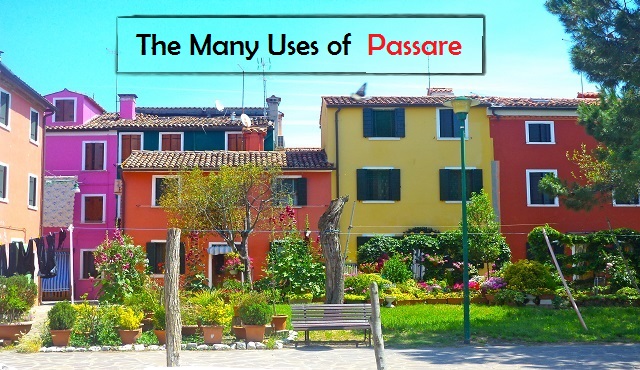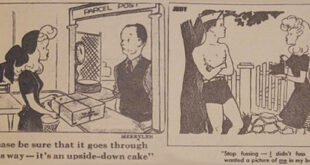The Italian verb passare means “to pass,” as in “to pass through,” “pass by,” “pass time,” or “spend time.” This verb is used in many ways in Italian! We use the verb “to pass” or “passed” less often in informal English, often defaulting to more general English verbs like, “get/gone,” “put” or “spend/spent” when we really mean “pass” or “passed.” But in Italian, it is important to be more specific and use the verb passare if you want to sound like a native when describing situations that have come to pass!
1. Use passare when you will “pick up” or “spend time with” someone
- Use the Italian verb passare when you want to “pass by” and “pick someone up.” Passare is used in the important everyday expression “passare a prendere,” which means “to pick (someone) up (by car).”
- In the same way, use the verb passare to describe “dropping in to see” someone or “dropping in to visit” someone with the phrases, “passare a far visita” and “passare a trovare.” The latter phrase is similar to, but not identical in meaning to “andare a trovare,” which you may recall means “to go to visit” someone.
- If you are inviting someone to visit you informally, but in an business setting, simply use passare with “in ufficio.” This phrase may be useful if you do not have a specific time you need to see someone on a particular day.
- Another common informal phrase is “passare un attimo da casa,” which means, “to drop by the house for a bit.” Use this phrase to invite a friend over for an informal get-together or quick meeting at your house. If you use the verb passare in conversation, this will signal both your familiarity with both the person you are visiting, and with the Italian language!
Passerò/Passo a prenderti alle otto.” I will (pass by and) pick you up at 8 AM.” Side note: if you want to ask someone to “pick you up” from a particular place, venire is used with prendere:
“Può venire alla stazione a prendermi?” “Can you (polite) come to the station and get me?” And a few more examples:
Domani, passo a far visita a mia zia Anna. Tomorrow, I will drop in to see my Aunt Ann. Domenica, passo a trovare la mia amica del cuore Maria. On Sunday, I will drop in to visit my dear friend Maria. Per favore, passi in ufficio domani mattina,
alle otto o dopo.Please drop in to my office tomorrow morning,
at 8 AM or later. (polite)La settimana prossima, passeremo un attimo da casa mia. Next week, let’s drop by my house for a bit. 2. Use passare to mention somebody “passing by.”
- If a person has recently “passed by,” someone else or “passed by”/ “gone through” a place, whether walking or driving, we must use essere as our past tense helping verb. Notice that this differs from English, and the English translation uses the verb “to have” instead.
-
“Ma quando Giovanni è passato davanti a me, l’ho riconosciuto.” “But when John passed by in front of me, I recognized him.” Michele non in piazza ancora. È passato! Michael is not in the piazza anymore. He has passed by!
3. Use passare when making references about time
- Use the verb passare to talk about time “passing by” in Italian, just as we do in English. Time “passes by” all by itself, and is the subject of the sentence, so we must use essere (to be) as our past tense helping verb.
“Quanto tempo è passato!” ha detto Maria quando lei ha incontrato una vecchia amica per strada. “How much time has gone by!” Mary said when she met an old friend on the street. - If we want to talk about how we were doing something “to pass the time,” in the recent past, or if we have “spent time at” a certain location, we must use the verb passare with avere as our helping verb for the past tense.
- To mention that you have “passed the night together with someone,” and imply an intimate relationship with that person, use the phrase, “passare una serata insieme.”
- To express the wish that someone “passes time well” over the holidays, use the verb passare with avere for the helping verb. (Notice the use of the subjunctive tense for avere with the verb sperare (to wish) in the example sentence.)
Ieri, ho passato tutto il pomeriggio a casa di Giulia. Yesterday, I stayed at Julia’s house all afternoon. Ieri sera, io e Michele abbiamo passato la serata insieme. Last night, Michael and I spent the night together. “Passa un buon Natale a Chicago!” “Have (spend) a nice Christmas in Chicago!” “Spero che la famiglia abbia passato un buon Natale!” “I hope that the family had a nice Christmas!” - In order “to let” or “allow” time, an event or comment to “pass by,” or to be ignored, we must use two verbs: lasciare and passare. If you want to read more about how to say “let” in Italian, visit our previous blog on this topic, “Italian for “Let me” and “Let’s.”
Lascia passare i mesi dell’inverno e d’estate pensiamo alle vacanze. Let the winter months pass and in the summer we will think about vacation. Lasica passare (perdere) il suo commento! Non importa! Ignore his comment! (command) It is not important! 4. Use passare when talking on the telephone
- Use the verb passare to ask someone to “put through” another person talking on the telephone to you. This situation is encountered most often at work, of course, when trying to reach an individual important enough to have a secretary to screen calls. The first example given below is therefore in the polite tense. Now-a-days many individuals have cell phones, so it is less common, but still possible, to call a land-line at home and have a family member answer, so the same question may also be useful in the familiar tense.
- When describing the act of passing the phone to someone in the past tense, use the helping verb avere (to have).
- Notice the use of definite and definite pronouns to replace subject pronouns and names in the last examples.
Mi può passare il signor Rossi? Can you put me through to Mr. Rossi? Passami Michele! Put me through to Michael! Ho passato Michele a te. I’ve put Michael through to you. (Italian “a te” not frequently used.) Ti ho passato Michele! I’ve put Michael through to you! Te l’ho passato! I’ve put him through to you! 5. Use the reflexive passarsi to exchange things with someone
- Finally, the reflexive verb, passarsi, has a slightly different meaning from the non-reflexive form that we have been discussing above. The reflexive verb passarsi means “to exchange” something and is used in the same way as the verb scambiarsi. Both verbs take essere in the past tense, of course, because they are reflexive!
“Allora, ci siamo passati i numeri di telefono per tenerci in contatto d’ora in poi.” “Anyway, we exchanged telephone numbers and will stay in contact from now on.” Remember how to use the Italian verb passare in conversation and I guarantee
you will use this verb every day!
 Fra Noi Embrace Your Inner Italian
Fra Noi Embrace Your Inner Italian








One comment
Pingback: Italian Phrases We Use EVERY Day! Impersonal Statements and Reflexive Verbs: “Come si dice…?” | Conversational Italian!